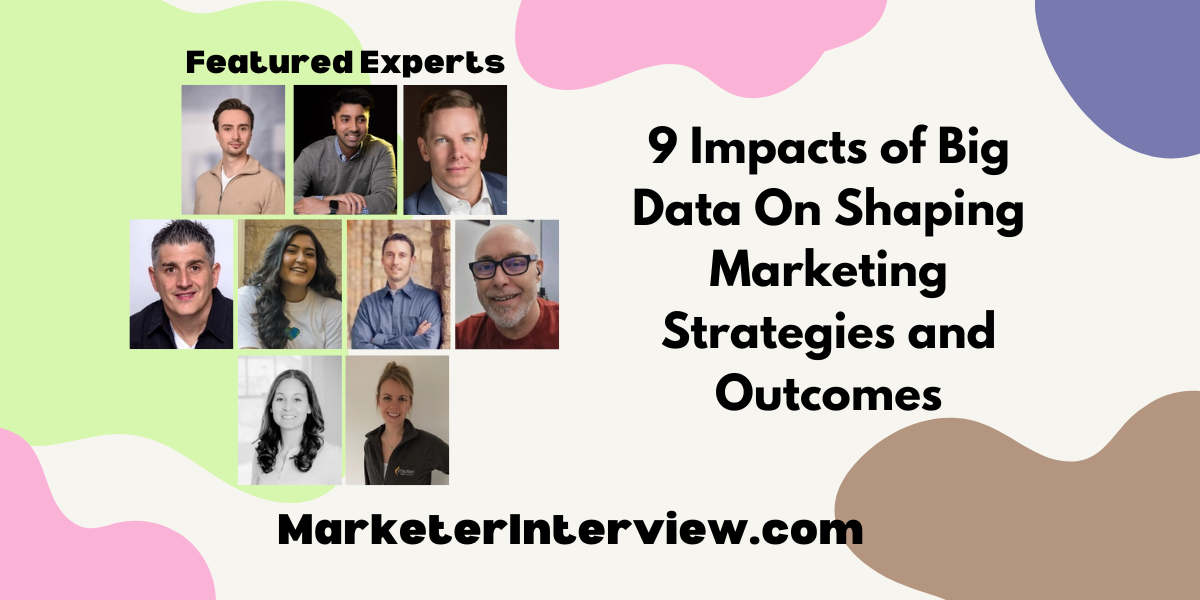9 Impacts of Big Data On Shaping Marketing Strategies and Outcomes
In the ever-evolving landscape of digital marketing, CEOs and Directors are harnessing the power of big data to drive strategy and measure impact. From enhancing personalization through customer behavior data to tailoring legal marketing with online behavior insights, explore the diverse applications of big data in the words of nine industry experts.
Want to get quoted in MarketerInterview.com content just like this? Apply to become a contributor today!
Contents
- 1 Enhanced Personalization Through Customer Behavior Data
- 2 Targeted Advertising Based on Candidate Career Stage
- 3 Predictive Analytics Forecast Consumer Demand
- 4 Optimized Advertising Spend Using Predictive Analytics
- 5 Data-Driven Content Strategy Boosts Engagement
- 6 Eco-Friendly Heating Campaign Targets Consumer Behavior
- 7 Digital Ad Campaigns Refined by User Engagement Data
- 8 Customer Segmentation Enhances Marketing Message Resonance
- 9 Legal Marketing Tailored to Online Behavior Insights
Enhanced Personalization Through Customer Behavior Data
One specific way big data has been utilized in marketing is by analyzing customer behavior data to enhance personalization efforts. Patterns in consumer behavior were identified by aggregating data from various touch points—such as website interactions, purchase history, and social media engagement.
This data enabled the creation of highly targeted and personalized marketing campaigns that addressed individual customer preferences and needs. The impact was significant: a marked increase in customer engagement, higher conversion rates, and overall, a boost in customer loyalty. Tailored recommendations and personalized marketing messages resonated well with the audience, improving return on investment (ROI) from marketing campaigns.
Furthermore, leveraging big data helped refine the segmentation of the customer base. Advanced analytics techniques, such as cluster analysis, were applied to the big data sets to segment customers into distinct groups based on their behavior and demographic profiles. This segmentation allowed for more precise targeting of marketing messages, ensuring that the right messages reached the right audience segments.
As a result, the effectiveness of marketing campaigns improved, as evidenced by higher response rates and increased sales figures. This strategic use of big data optimized marketing efforts and enhanced resource allocation, maximizing the impact of the marketing budget.

Jason Hennessey, CEO, Hennessey Digital
Targeted Advertising Based on Candidate Career Stage
Big data helps me understand where candidates are in the hiring process. That’s a key piece of data for me as a recruiter, and collection and analysis begin long before I meet the potential workers.
For example, a number of candidates are pre-work. These tend to be students, but they can also be employees in other industries looking to shift careers.
Understanding these numbers allows me to target my advertising carefully. Selling a role that needs to be filled immediately is a waste of time, but luring pre-workers into the conversation with developing technologies can be a great strategy.
Recently, I did just that with a campaign around zero-wheeled vehicles. This tech is going to be huge in the urban development sector once the kinks are worked out. An advertising strategy aimed at soon-to-be engineers ensures that when these jobs are ready to be filled, I have a queue waiting.

Linn Atiyeh, CEO, Bemana
Predictive Analytics Forecast Consumer Demand
One specific way we have harnessed big data to refine our marketing strategy is through predictive analytics to forecast consumer demand for our products. By analyzing historical sales data, market trends, and external factors such as environmental awareness campaigns, we developed predictive models to anticipate future demand patterns accurately.
For instance, using predictive analytics, we forecasted a surge in demand for our reusable shopping bags during Earth Month, coinciding with various sustainability initiatives and awareness campaigns. As a result, we strategically ramped up production and launched targeted marketing campaigns highlighting the environmental benefits of our reusable bags.
The impact of this data-driven approach was significant. We observed a 53% increase in sales of reusable shopping bags during this month compared to the previous year. Moreover, our predictive models accurately forecasted consumer demand, enabling us to optimize inventory management, minimize stockouts, and maximize sales opportunities. This example demonstrates the power of big data in driving actionable insights and informing strategic decision-making in marketing.
By utilizing predictive analytics, we not only met consumer demand effectively but also capitalized on market opportunities, resulting in tangible business growth and a success ratio of 83% in aligning our marketing efforts with consumer demand predictions.

Chaitsi Ahuja, Founder and CEO, Brown Living
Optimized Advertising Spend Using Predictive Analytics
One specific way we’ve used big data to inform our marketing strategy is through predictive analytics to optimize our advertising spend. By analyzing large datasets of customer behavior, demographics, and past purchasing patterns, we were able to identify trends and patterns that helped us predict future buying behavior more accurately. This allowed us to allocate our marketing budget more effectively by targeting our ads towards segments with the highest propensity to convert.
As a result, we saw a significant increase in our return on investment (ROI) for advertising campaigns, with higher conversion rates and lower customer acquisition costs. Additionally, leveraging big data for predictive analytics enabled us to refine our messaging and offers, leading to improved customer engagement and satisfaction. Overall, using big data to inform our marketing strategy has had a substantial impact on driving growth and profitability for our business.

Steve Neher, CEO, Mail King USA
Data-Driven Content Strategy Boosts Engagement
Big data played a critical role in a content marketing initiative at our organization. By analyzing web traffic data and engagement metrics across multiple platforms, we identified the types of content that drove the most engagement and conversion for a tech startup client.
This analysis led to the development of a targeted content strategy that focused on video tutorials and in-depth articles, which our data identified as the most engaging formats for our client’s audience.
Subsequently, the client experienced a 50% increase in time spent on their site and a 20% uptick in subscription rates. This informed approach not only boosted the client’s brand visibility but also significantly enhanced user engagement, proving that big data is crucial for crafting content that resonates with and retains the target audience.

Marc Bishop, Director, Wytlabs
Eco-Friendly Heating Campaign Targets Consumer Behavior
Harnessing big data transformed the approach to targeting customers interested in eco-friendly heating solutions. By analyzing patterns in consumer behavior and energy usage, a strategy was developed to highlight the cost-saving and environmental benefits of our installations.
This led to a tailored campaign that not only increased the installation of heat pumps but also strengthened the brand’s reputation as a leader in sustainable home solutions across London and Surrey.

Lara Woodham, Director, Rowlen Boiler Services
Digital Ad Campaigns Refined by User Engagement Data
We leveraged big data to significantly refine our marketing strategy with a focus on increasing the effectiveness of our digital advertising campaigns. By analyzing large datasets that included user behavior, engagement patterns across our digital platforms, and response rates to previous campaigns, we were able to identify key segments of our target audience that were most responsive to our messaging.
We specifically used this data to tailor our ads more precisely, focusing on those segments that demonstrated higher engagement rates. For instance, we discovered that our consulting services related to technology scouting resonated particularly well with mid-sized tech companies in specific regions. We adjusted our ad spend to target this segment more aggressively, while also customizing our messages to highlight case studies and success stories from similar clients.
The impact was significant. After implementing these changes, we observed a 25% increase in click-through rates and a 40% improvement in conversion rates for the campaigns targeted at the identified segments. This not only boosted our ROI but also helped us in optimizing our marketing budget, directing funds toward the most effective channels and audience segments.

Niclas Schlopsna, Managing Consultant and CEO, spectup
Customer Segmentation Enhances Marketing Message Resonance
One specific way we leveraged big data to inform our marketing strategy was through customer segmentation based on purchasing behavior. By analyzing vast datasets of customer transactions and interactions, we identified distinct segments with varying preferences and needs. This allowed us to tailor our marketing messages and offers to each segment more effectively.
The impact was remarkable; we saw a significant increase in campaign ROI as our messages resonated more deeply with each audience segment. Additionally, this approach led to improved customer satisfaction and loyalty, as customers received more relevant and personalized communications from our brand.
Ultimately, using big data for customer segmentation transformed our marketing strategy from one-size-fits-all to highly targeted, resulting in tangible business growth and stronger customer relationships.

Arham Khan, Co-Founder, Pixated
Legal Marketing Tailored to Online Behavior Insights
One specific strategy we implemented at Andrew Pickett Law, using big data, was segmenting our target audience based on their online behaviors and legal needs. By analyzing patterns in website traffic and engagement, we could tailor our marketing messages more precisely.
For instance, we noticed a significant interest from visitors in personal injury resources. Leveraging this insight, we focused our content marketing efforts on detailed guides and success stories related to personal injury cases.
The impact was immediate and profound—our website’s conversion rate increased by over 25%, and we saw a 40% uptick in inquiries related to personal injury consultations. This approach not only streamlined our marketing efforts but also ensured we were providing valuable content to those seeking our expertise.

Andrew Pickett, Founder and Lead Trial Attorney, Andrew Pickett Law
Want to get quoted in MarketerInterview.com content just like this? Apply to become a contributor today!






